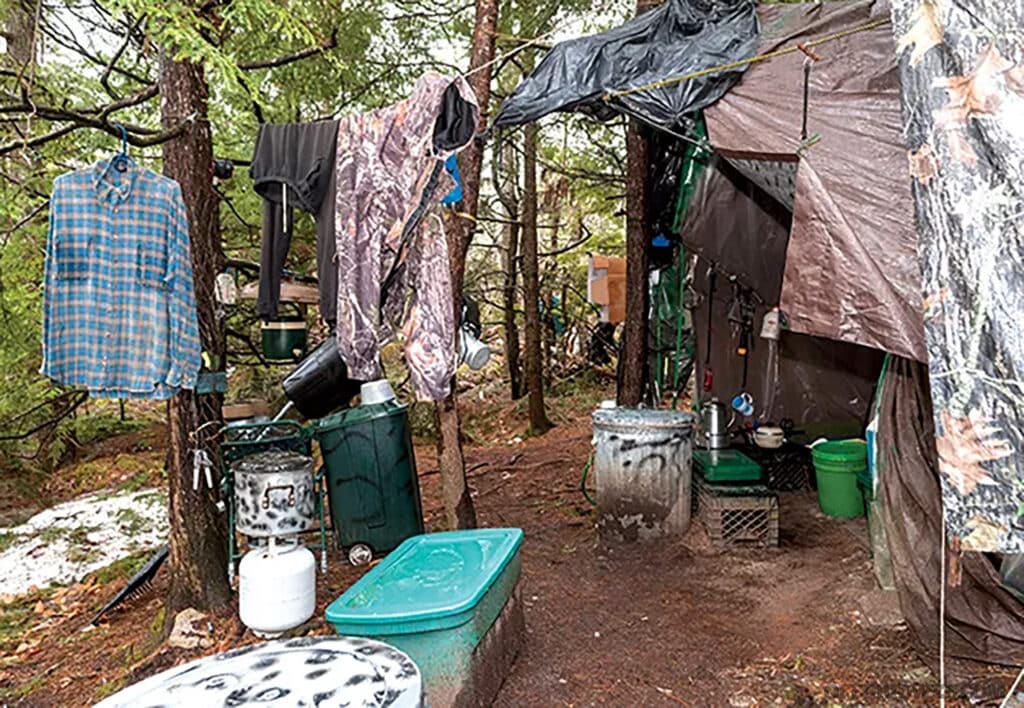RECOIL OFFGRID Survival Becoming Invisible in Woodland Areas: The Story of Christopher Knight
In This Article
In an era dominated by advanced technology, the notion of living undetected in the woods for an extended period seems implausible. However, the story of Christopher Knight, who lived alone in the forests of Maine for twenty-seven years, challenges this belief. His remarkable tale offers valuable lessons in self-reliance, resourcefulness, endurance, and perseverance.
In 1986, Christopher Knight, a 20-year-old home security system installer, vanished into the wilderness of Maine. Raised in a deeply religious and reserved family, Knight's disappearance was not widely publicized, as his family believed it was a voluntary act. Knight's desire for solitude drove him to leave civilization behind, armed with basic camping supplies and a determination to find peace in the woods.
Knight's upbringing played a significant role in his decision to disappear. His family, known for their reclusiveness, did not spread the word about his disappearance. They believed he needed time alone, a trait he had exhibited since childhood. Knight's early life was marked by a preference for solitude, and this inclination eventually led him to one of the most extreme forms of isolation.

Knight's journey into isolation was driven by a strong will and a longing to live as a true loner. Despite lacking survival skills, Knight's intelligence and resourcefulness allowed him to thrive. He meticulously selected a secluded spot protected by large boulders, ensuring his camp remained hidden from prying eyes.
Knight's dream was to live a life free from societal constraints, a life where he could be alone with his thoughts and the natural world. He wanted to emulate the legendary figures of pure hermits—those who lived without modern conveniences and societal ties. His determination to achieve this dream was unwavering, even as he faced numerous challenges.

Above: Photo of Christopher Knight's camp (Photo Credit: Jennifer Smith Mayo)
Knight's ability to remain undetected for nearly three decades was a testament to his mastery of scoutcraft and anti-tracking techniques. He carefully monitored his surroundings, minimizing footprints and moving stealthily on pine needles and leaves to avoid making noise. This not only minimized noise but also reduced the chances of leaving a visible trail. His efforts to camouflage his camp with dark tarps and paint ensured it blended seamlessly with the environment.
Knight also paid close attention to the patterns of his movements. He avoided creating a regular path that could be easily detected and followed. By varying his routes and timing, he ensured that any potential trackers would find it challenging to predict his movements. His meticulous approach to anti-tracking was a critical factor in his long-term success at remaining hidden.

Above: Knight employed movement tactics, such as only walking on hard surfaces, to avoid other detecting his footprints.
Knight's daily life revolved around maintaining his camp and ensuring his survival. He never started a fire to avoid detection, relying instead on stolen gas cylinders for cooking and heating. Knight meticulously cleaned and stored his supplies, boiling water for drinking and gathering rainwater to sustain himself.
His camp, hidden between two large boulders, was set up with dark brown tarps to blend with the environment. Knight used paracords to secure his tent and added layers of tarps to keep water out. He insulated the ground with plastic bags and additional tarps to maintain a dry living space. Every aspect of his camp was designed to be as inconspicuous and practical as possible.
This daily routine involved checking for tracks around his camp to ensure no one had discovered his hiding place. He moved stealthily, taking care to leave no trace of his presence. His dedication to maintaining an undetected existence was evident in every action he took.
Survival in the harsh winters of Maine required Knight to steal essential supplies from nearby homes. His knowledge of security systems allowed him to break in without leaving a trace, taking food, clothing, and tools to make his life more comfortable. Despite his actions, Knight remained focused on his goal of living a pure, solitary life.
Knight's ability to survive harsh Maine winters without starting a fire is particularly noteworthy. Fires would have drawn attention, risking his discovery. Instead, he relied on the gas cylinders he stole from homes to cook and heat his shelter. This method required regular trips to nearby properties, where he would discreetly collect supplies without damaging locks or doors.
He also scavenged for food, primarily targeting items with long shelf lives. Canned goods, dried foods, and other non-perishable items became his staples. Knight was meticulous about cleaning up after himself, ensuring that his activities left no trace. He disposed of packaging and used supplies carefully, often burying them to prevent detection.
In addition to food and heating supplies, Knight stole clothing and tools. Extra fleeces, trousers, jackets, and sturdy boots were essential for surviving the cold Maine winters. He even managed to procure books, magazines, a TV, and a radio, providing him with mental stimulation and a connection to the outside world, albeit a limited one.

Above: Knight's life in the wilderness relied heavily on foraging and scavenging for resources.
At the age of forty-seven, Knight was finally arrested and charged with over a thousand minor break-ins. His story, documented by journalist Michael Finkel in “The Stranger in the Woods,” revealed a man driven by a desire for authenticity and a disdain for societal norms. Knight's journey highlighted the lengths one can go to achieve a life of solitude and self-reliance.
Knight's arrest marked the end of an extraordinary chapter in his life. The authorities had long been aware of a mysterious figure responsible for numerous burglaries in the North Pond area, but they had been unable to catch him. Knight's knowledge of security systems and his careful planning had allowed him to evade capture for years.
When Knight was finally apprehended, he was in poor health and had been living in increasingly harsh conditions. Despite the challenges, he had maintained his solitary existence, driven by a deep-seated need to be alone. His arrest brought his story to public attention, sparking widespread interest and fascination.
Michael Finkel's book provided an in-depth look at Knight's life and motivations. Through interviews and extensive research, Finkel painted a picture of a man who had chosen to reject societal norms in favor of a life of solitude and self-sufficiency. Knight's story resonated with many, offering a glimpse into the complexities of human nature and the lengths to which some will go to achieve personal authenticity.
Above: Knight’s 1984 yearbook photo from Lawrence High School.
Knight's story offers valuable insights into the human desire for solitude and the ability to survive in extreme conditions. His experience underscores the importance of self-reliance and resourcefulness. While his actions, particularly the thefts, were illegal, they were driven by a profound need to live a life free from societal constraints. Knight's journey challenges us to consider what it means to live authentically and the lengths we might go to achieve that.
Knight's story raises questions about the nature of solitude and the human need for connection. While many people seek companionship and community, others, like Knight, find solace in isolation. His ability to thrive in the wilderness for so long is a testament to the human spirit's adaptability and resilience.
The lessons from Knight's experience are particularly relevant in today's world, where technology and constant connectivity often dominate our lives. Knight's journey reminds us of the importance of self-reliance and the value of being able to disconnect from the hustle and bustle of modern life. His story encourages us to explore the balance between solitude and connection and to appreciate the skills and mindset required to live independently.
Christopher Knight's story is a powerful reminder of the resilience and adaptability of the human spirit. His ability to live undetected in the woods for twenty-seven years, despite lacking advanced skills or technology, highlights the importance of determination and ingenuity. Knight's tale is a unique tale as far as survival stories go, offering lessons in self-reliance, resourcefulness, and the pursuit of personal authenticity.
Knight's journey into the wilderness was driven by a profound desire to escape the constraints of society and live a life of solitude. His story challenges our perceptions of what it means to be self-reliant and resourceful, demonstrating that with determination and ingenuity, one can overcome even the most daunting challenges. While Knight's actions, particularly his thefts, were illegal, they were motivated by a deep-seated need to survive and maintain his solitary existence. His story is a testament to the lengths some individuals will go to achieve their goals and live a life true to their values.
Subscribe to Recoil Offgrid's free newsletter for regular updates on more content like this.
Editor's Note: This article has been modified from its original print version for the web.
 STAY SAFE: Download a Free copy of the OFFGRID Outbreak Issue
STAY SAFE: Download a Free copy of the OFFGRID Outbreak Issue
No Comments